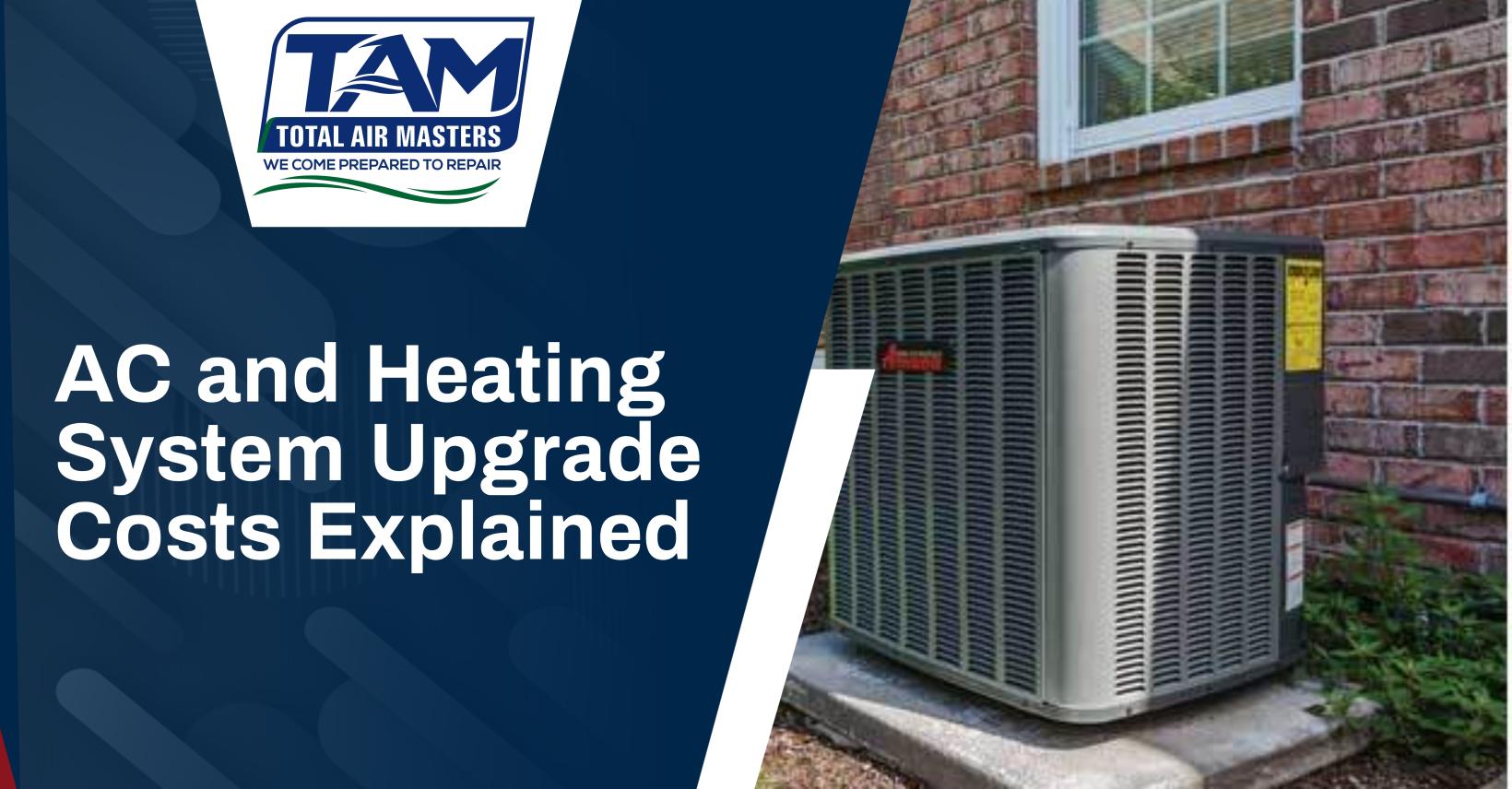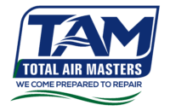
Upgrading your current air conditioning or heating system can be a significant home improvement, providing increased energy efficiency, improved comfort, and potentially long-term cost savings. However, the process of upgrading these systems can be complex, involving the initial investment, installation, and ongoing operational costs. As your local AC company, Total Air Masters is here to help homeowners understand the various factors that contribute to the cost of upgrading an AC or heating system and how to make an informed decision based on your specific needs and budget.
Whether you’re considering replacing an outdated system or seeking to upgrade to a more energy-efficient model, our comprehensive guide will explore the key aspects that determine the costs involved in upgrading your current AC or heating system. We will cover factors such as the type of system you choose, your home’s size, energy efficiency ratings, installation costs, and available tax credits or rebates. Trust Total Air Masters to provide the expert guidance and support you need to ensure a smoother, more cost-effective upgrade process, resulting in a comfortable and energy-efficient home for years to come.
Choosing the Right Type of System
One of the primary factors that will impact the cost of upgrading your AC or heating system is the type of system you choose. Different types of systems have varying price points and operational costs, which can influence the overall cost of upgrading. Some common system types include:
1. Central Air Conditioning Systems: These systems are popular because they efficiently cool the entire home, using a network of ducts to distribute cooled air throughout the living space. Pricing can vary depending on the brand, model, and size of the unit.
2. Ductless Mini-Split Systems: Ideal for homes without existing ductwork or those looking for targeted cooling, these systems consist of individual indoor units connected to an outdoor compressor. They can be more energy-efficient than central AC systems but may have higher installation costs.
3. Furnaces: The most common type of heating system, furnaces provide heat through forced air and are available in various models, including gas, oil, and electric. The cost to upgrade will depend on the fuel and model chosen.
4. Heat Pumps: By transferring heat between indoor and outdoor environments, heat pumps can provide efficient heating and cooling for your home. Keep in mind that costs can vary widely based on the type of heat pump (air-to-air, geothermal, or mini-split), installation requirements, and regional climate.
Your Home’s Size and Layout
The size and layout of your home will also play a significant role in determining the cost of upgrading your AC or heating system. Larger homes typically require more powerful and higher-capacity systems, which can increase initial and ongoing expenses. Additionally, homes with complex layouts, multiple stories, or unique architectural features may require additional equipment or installation work, also influencing the overall cost.
Energy Efficiency Ratings and Operational Costs
When considering an upgrade, it’s crucial to evaluate the energy efficiency of the new system. Higher energy efficiency can lead to long-term savings on utility bills, offsetting the initial upgrade costs.
For AC systems, the Seasonal Energy Efficiency Ratio (SEER) rating indicates energy efficiency, with a higher rating equating to better efficiency. For heating systems, the Annual Fuel Utilization Efficiency (AFUE) reflects the percentage of fuel consumed that is converted into heat, while the Heating Seasonal Performance Factor (HSPF) is used for heat pumps. Systems with higher efficiency ratings may have higher upfront costs but can result in substantial energy savings over time.
Installation Costs and Professional Assistance
The cost of professional installation can significantly impact the overall cost of upgrading your AC or heating system. Several factors can influence installation costs, including:
1. The complexity of the project: A more complicated installation may involve additional labor and materials, resulting in higher costs.
2. Extent of modifications: Upgrading to a different type of system or making significant changes to your home’s infrastructure (e.g., adding ductwork) can increase the cost of installation.
3. Local labor rates and availability: Labor rates for HVAC technicians can vary based on your location and the demand for services in your area.
While it may be tempting to cut costs by attempting a DIY installation, it’s essential to work with a trained and licensed HVAC professional to ensure proper installation, avoid potential hazards, and maintain any manufacturer warranties.
Tax Credits, Rebates, and Incentives
It’s worth exploring available tax credits, rebates, and incentives when calculating the cost of upgrading your AC or heating system. Many state, federal, and utility programs offer financial incentives to encourage homeowners to invest in energy-efficient HVAC systems. These incentives can help offset the initial costs and provide a quicker return on investment. Be sure to research and consider any programs available in your area before making a purchase.
Additional Considerations for an Optimized System Upgrade
1. Home Energy Audit
A home energy audit can provide valuable insights into your home’s overall energy efficiency and identify areas where improvements can be made. By addressing any insulation, weatherization, or air leakage issues, you can optimize your home’s energy performance and maximize the benefits of a new, more efficient AC or heating system.
2. Proper Equipment Sizing
When upgrading your AC or heating system, it’s crucial to properly size the new equipment to match your home’s cooling and heating needs. An oversized or undersized system can negatively impact energy efficiency, decrease comfort, and shorten the unit’s lifespan. A professional HVAC technician can assess your home’s specific needs and recommend the appropriate equipment size for optimal performance and efficiency.
3. Maintenance Plans and Warranties
After upgrading your AC or heating system, consider enrolling in a preventive maintenance plan with your HVAC professional to keep the new system running at peak efficiency. Additionally, always review the manufacturer’s warranty and understand the terms and conditions to protect your investment and ensure any future repair needs are covered.
Invest in Comfort and Efficiency with Total Air Masters
Upgrading your current AC or heating system is a significant investment, but it can lead to improved comfort, energy efficiency, and long-term cost savings for your home. By considering factors such as system type, home size, energy efficiency ratings, installation costs, and available incentives, you can make an informed decision that meets your unique needs and budget.
Don’t hesitate to reach out to the experienced professionals at Total Air Masters for expert guidance, top-quality installation services, and ongoing support throughout the upgrade process. We’re here to help you make the best decision for your home, ensuring comfort and efficiency for years to come. Contact Total Air Masters today for a consultation, and let us assist you in upgrading your AC or heating system to achieve optimal performance and energy savings.
